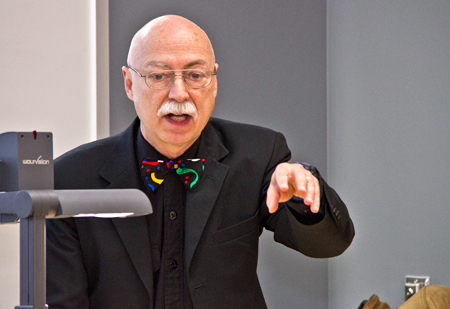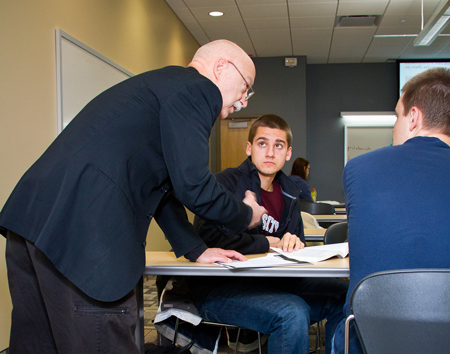Posted 12:54 p.m. Thursday, Nov. 17, 2011

 [/caption]
A UW-La Crosse Professor who has been named the state’s top educator says his students deserve the recognition.
“This award, in the end, belongs to them. I wouldn’t be here without them,” says Greg Wegner, UW-L professor of history. “My ability to teach, research, write and publish is refreshed and renewed through teaching students.”
Wegner accepted the 2011 Wisconsin Professor of the Year award Thursday, Nov. 17, in Washington, D.C. He was selected from college educators across the U.S. for the award from The Carnegie Foundation for the Advancement of Teaching and the Council for Advancement and Support of Education.
A reception for Wegner will be from 3:30 - 5 p.m. Monday, Nov. 21, in Strelczyk Great Hall at UW-L's Cleary Alumni & Friends Center.
Wegner, a UW-L graduate, says questions are what ‘make a university tick’ and a good teacher respects the power of the question. In classes he asks plenty of them. In his black suit coat and colorful bow tie, he walks from desk to desk during a Friday morning class. He asks students about their thoughts on the implications of the Communist Manifesto.
“Fellow historians let’s put our heads together. Sanders claims Karl Marx is seen as one of the most dangerous men in modern history. Was Sanders right?” he asks with conviction.
[caption id="attachment_7680" align="alignleft" width="450" caption="Gregory Wegner, UW-L professor of history, talks to Isaac Michalski, UW-L freshman, and other students during a group discussion time in class."]
[/caption]
A UW-La Crosse Professor who has been named the state’s top educator says his students deserve the recognition.
“This award, in the end, belongs to them. I wouldn’t be here without them,” says Greg Wegner, UW-L professor of history. “My ability to teach, research, write and publish is refreshed and renewed through teaching students.”
Wegner accepted the 2011 Wisconsin Professor of the Year award Thursday, Nov. 17, in Washington, D.C. He was selected from college educators across the U.S. for the award from The Carnegie Foundation for the Advancement of Teaching and the Council for Advancement and Support of Education.
A reception for Wegner will be from 3:30 - 5 p.m. Monday, Nov. 21, in Strelczyk Great Hall at UW-L's Cleary Alumni & Friends Center.
Wegner, a UW-L graduate, says questions are what ‘make a university tick’ and a good teacher respects the power of the question. In classes he asks plenty of them. In his black suit coat and colorful bow tie, he walks from desk to desk during a Friday morning class. He asks students about their thoughts on the implications of the Communist Manifesto.
“Fellow historians let’s put our heads together. Sanders claims Karl Marx is seen as one of the most dangerous men in modern history. Was Sanders right?” he asks with conviction.
[caption id="attachment_7680" align="alignleft" width="450" caption="Gregory Wegner, UW-L professor of history, talks to Isaac Michalski, UW-L freshman, and other students during a group discussion time in class."] [/caption]
It’s typical for Wegner to ask for students’ views, says Isaac Michalski, UW-L freshman. “This class changes the way we view society,” he explains. “It makes us think about how we got here and what we are going to do going forward.”
Wegner started asking his own questions about society and history as a child growing up in Bangor, Wis. He would check out books at the UW-L library, start up conversations with college students and ask local WWII veterans about their war experience — particularly what they witnessed in concentration camps.
“I thought, ‘How could this mass murder happen?’ ‘Why were innocent children and pregnant mothers sent to gas chambers?’” he recalls. “To this day I still can’t fully answer the question of why, yet we must try our best to grasp it because we still deal with genocide today.”
Wegner has been researching the Holocaust for more than 40 years. He started when he became a student at UW-L in 1968 and teachers like the late history professor Bill Vettes inspired him to continue to dig into history.
“It goes to show you how a good teacher can impact another person’s life,” he says.
Wegner has been teaching at UW-L since 1989. During the current semester, he teaches HIS 102 with first year students centered around the theme of the history of science and technology. He also teaches a course on the history of education and, next semester, will also lead a class on the history of the Holocaust.
Since he started at UW-L, the campus Faculty Research & Grants committee has awarded him six grants, which have all led to publications. He has published two books, one on Nazi education, “Anti-Semitism and Schooling Under the Third Reich” (2002) and “Curriculum Handbook on Social Studies: A Resource for Administrators” (2000). He has also published 38 refereed journal articles for journals in the U.S., Germany, Belgium, Great Britain and Australia.
He is also a community literacy volunteer in Bangor and is the National History Day regional coordinator for western Wisconsin. The annual regional program reaches about 1,300 middle school and high school students each year.
He says he never gets bored with his career because his work is filled with pondering meaningful questions relating to what it means to be human, the relationship between the individual and the state, and the vexing continuation of genocides and mass murder in the world community.
“I have to think like a student and be hungry for knowledge,” he says. “I don’t have all the answers. It’s the questions that should drive good teaching. I’m 61, but, at heart, I’m a student before I’m a teacher.”
For more information www.usprofessorsoftheyear.org
[/caption]
It’s typical for Wegner to ask for students’ views, says Isaac Michalski, UW-L freshman. “This class changes the way we view society,” he explains. “It makes us think about how we got here and what we are going to do going forward.”
Wegner started asking his own questions about society and history as a child growing up in Bangor, Wis. He would check out books at the UW-L library, start up conversations with college students and ask local WWII veterans about their war experience — particularly what they witnessed in concentration camps.
“I thought, ‘How could this mass murder happen?’ ‘Why were innocent children and pregnant mothers sent to gas chambers?’” he recalls. “To this day I still can’t fully answer the question of why, yet we must try our best to grasp it because we still deal with genocide today.”
Wegner has been researching the Holocaust for more than 40 years. He started when he became a student at UW-L in 1968 and teachers like the late history professor Bill Vettes inspired him to continue to dig into history.
“It goes to show you how a good teacher can impact another person’s life,” he says.
Wegner has been teaching at UW-L since 1989. During the current semester, he teaches HIS 102 with first year students centered around the theme of the history of science and technology. He also teaches a course on the history of education and, next semester, will also lead a class on the history of the Holocaust.
Since he started at UW-L, the campus Faculty Research & Grants committee has awarded him six grants, which have all led to publications. He has published two books, one on Nazi education, “Anti-Semitism and Schooling Under the Third Reich” (2002) and “Curriculum Handbook on Social Studies: A Resource for Administrators” (2000). He has also published 38 refereed journal articles for journals in the U.S., Germany, Belgium, Great Britain and Australia.
He is also a community literacy volunteer in Bangor and is the National History Day regional coordinator for western Wisconsin. The annual regional program reaches about 1,300 middle school and high school students each year.
He says he never gets bored with his career because his work is filled with pondering meaningful questions relating to what it means to be human, the relationship between the individual and the state, and the vexing continuation of genocides and mass murder in the world community.
“I have to think like a student and be hungry for knowledge,” he says. “I don’t have all the answers. It’s the questions that should drive good teaching. I’m 61, but, at heart, I’m a student before I’m a teacher.”
For more information www.usprofessorsoftheyear.org